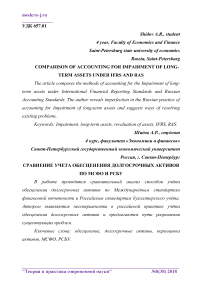Подготовка специалиста: сравнение зарубежного опыта и российской практики
Автор: Шидов А.Р.
Журнал: Теория и практика современной науки @modern-j
Рубрика: Основной раздел
Статья в выпуске: 8 (38), 2018 года.
Бесплатный доступ
В работе рассматриваются современные тенденции и процессы, происходящие в сфере экономики труда в области подготовки специалистов, проводится сравнение зарубежного опыта и российской практики, анализируется зарубежная специфика корпоративного обучения и возможность её внедрения в актуальную российскую практику.
Экономика труда, подготовка специалистов, кадров, корпоративное обучение
Короткий адрес: https://sciup.org/140273766
IDR: 140273766
Текст научной статьи Подготовка специалиста: сравнение зарубежного опыта и российской практики
In Russian accounting theory and practice, there is no requirement to test long-term assets for impairment, as set out in IAS 36 Impairment of Assets.
IAS 36 Impairment of Assets seeks to ensure that an entity's assets are not carried at more than their recoverable amount. Asset testing for impairment under IAS 36 is based on the premise that the book value of assets should not exceed the economic benefits that a company can derive from the sale or use of such assets. Until recently, Russian PBUs did not provide for impairment testing of assets. The first attempt to introduce into the Russian theory of accounting such an impairment test was undertaken in PBU 14/2007 for intangible assets. Paragraph 22 of this PBU states that "intangible assets may be tested for impairment in the manner prescribed by International Financial Reporting Standards". They can, but need not. Until the application of this item in practice, the matter naturally will not come until a standard similar to IAS 36 is developed in the system of Russian PBUs.
But with reference to the fixed assets, which constitute the bulk of assets in most Russian companies, such a rule has not yet been prescribed. Meanwhile, the lack of verification of the Impairment of long-term assets, in particular fixed assets, may lead to an overestimation of their book value in RAS accounting.
In this case, the financial position and financial results of the company, reflected in the Russian financial statements, will not correspond to the actual state of affairs. And this, in turn, can serve as the reason for making unreasonable economic decisions.
The absence in RAS of the requirement to test for impairment of property, plant and equipment and recognize impairment losses seriously undermines the users' confidence in Russian reporting. This problem could be solved by a regular revaluation of fixed assets, which is permitted (but not a requirement) in PBU 06/01, but most Russian companies prefer to account for fixed assets at historical cost.
Список литературы Подготовка специалиста: сравнение зарубежного опыта и российской практики
- Ефимушкин С.Н. Инновации, предпринимательство и гуманизм в подготовке специалиста (опыт зарубежного сотрудничества) // КЭ. 2012. №8. Режим доступа: [https://cyberleninka.ru/article/n/innovatsii-predprinimatelstvo-i-gumanizm-v-podgotovke-spetsialista-opyt-zarubezhnogo-sotrudnichestva] (дата обращения: 13.07.2018).
- Масалимова А.Р. Зарубежные технологии корпоративного обучения: сущность и их значение для отечественной практики наставнической деятельности // КПЖ. 2012. №4 (94). Режим доступа: https://cyberleninka.ru/article/n/zarubezhnye-tehnologii-korporativnogo-obucheniya-suschnost-i-ih-znachenie-dlya-otechestvennoy-praktiki-nastavnicheskoy-deyatelnosti (дата обращения: 13.07.2018).


